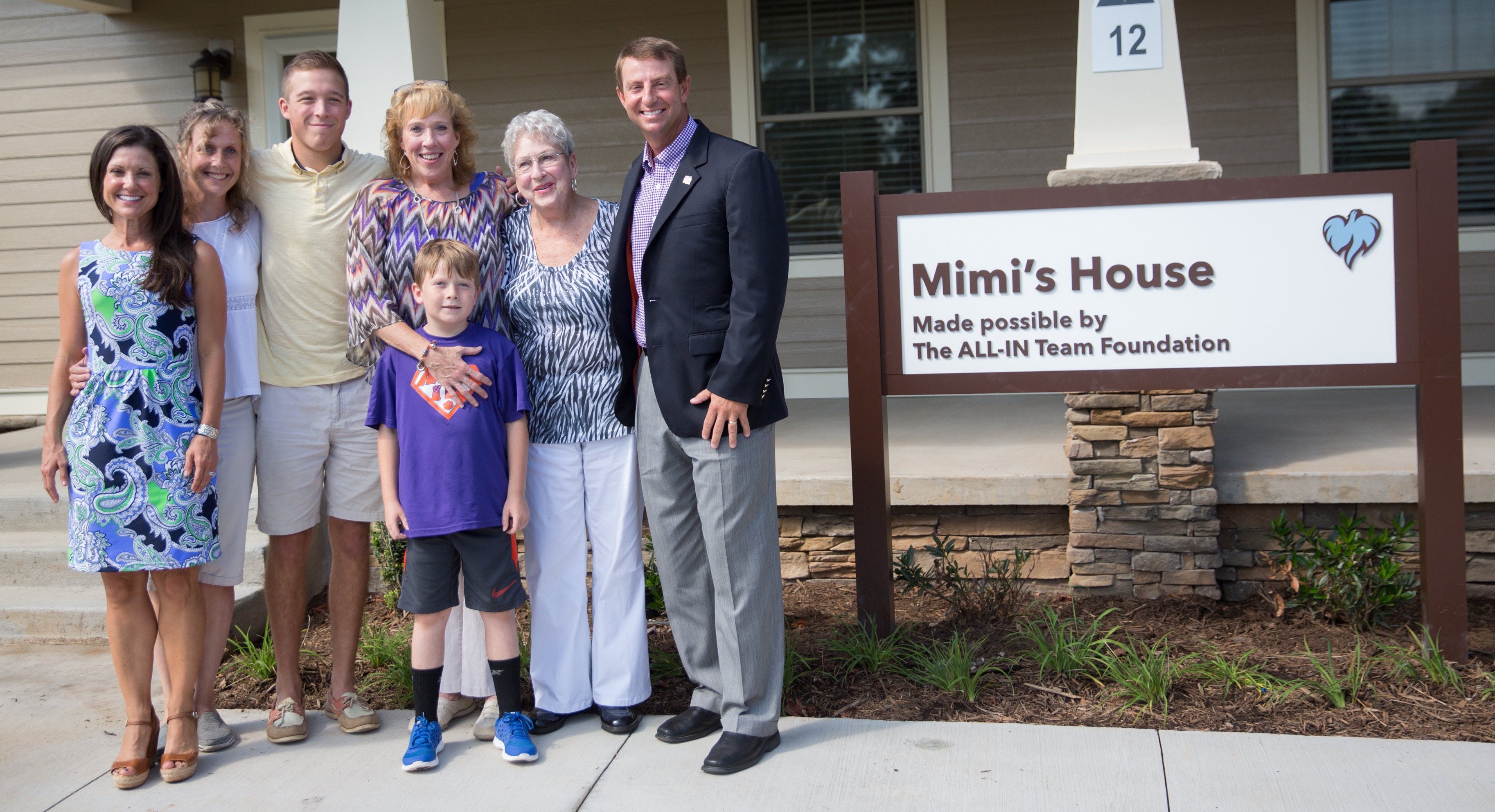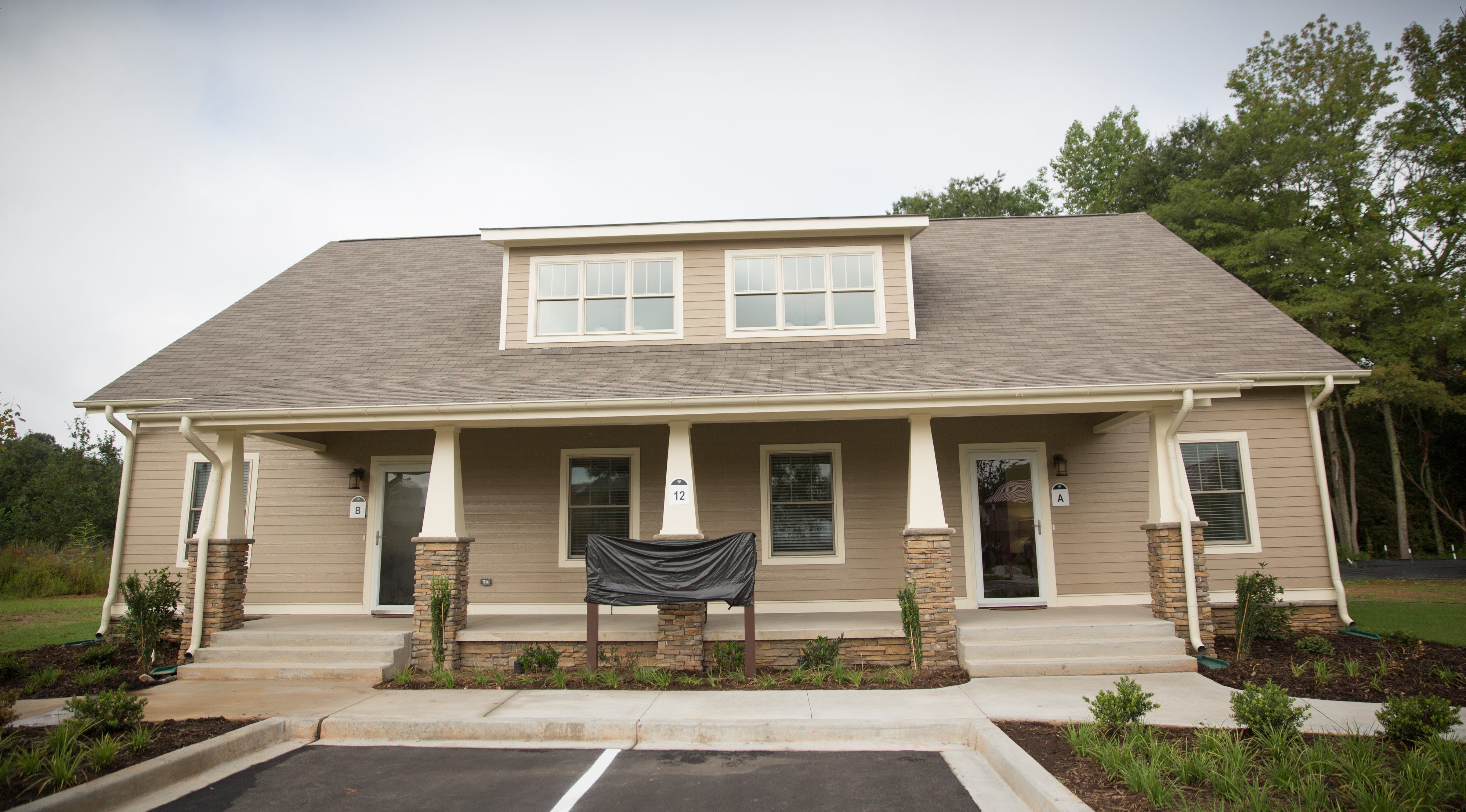Kathleen Swinney hit a snag.
In August of 2015, she and her husband, Clemson head football coach Dabo Swinney, planned for Mimi Metcalfe to join them for a special ceremony at one of the programs that’s supported by their All-In Foundation.
Serenity Place is a unique, residential program in Greenville, S.C. that specializes in treatment for pregnant women, young mothers and their preschool children. It’s a program for mothers who have nearly lost it all. They come to the program adrift in the darkness of addiction.
For some, Serenity Place is the last opportunity to help themselves and keep from losing their children. The program works to heal the mother’s addiction through intensive counseling, while specialized treatment for the children corrects the development delays and emotional traumas that’s accompanied with parents that are addicted to drugs and alcohol.
“These women are amazing,” Kathleen said. “Some of them were abused when they were younger. Some of them have really sad stories. They have some really heartbreaking stories, yet they want to come and get help. They graduate from the program. They are great moms.”
Metcalfe is a great mom, too. That’s why the Swinneys both agreed that Metcalfe’s name needed to be on the $270,000 safe home that the All-In Foundation helped build for Serenity Place graduates.
The Swinneys’ plan was to surprise Metcalfe with the news at the ceremony, but she had a scheduling conflict.
Battling back
Who is Mimi Metcalfe and why is she so important to Dabo and Kathleen Swinney?
In 2008, Metcalfe’s son, Charlie, played on a travel squad with their oldest son, Will. The boys became close friends, so did their parents.
“When your son plays travel ball, you spend the weekend with people,” Metcalfe said. “So I got to know their family, Dabo’s mom, and they got to know my family really well. That’s what really got us so close.”
Over the next six years, the parents shared stories. Dabo, who came from a home where alcoholism split up his family, shared his stories about his relationships with his father and one of his brothers.
“It gradually just happened,” Metcalfe said.
She grew up in Clemson. Her father was a professor at Clemson University and her mother was a nurse. Childhood, Metcalfe described, was a normal one.
“I was just a great kid,” she said. “I was an athlete. I was the Student Body President in high school.”
It was around that time when her curiosity about drinking began. It wasn’t peer pressure that made her take her first drink. It was the fascination about why people wanted to drink in the first place.
She soon understood.
“I loved it. I loved how it made me feel,” said Metcalfe, who took her first drink at 15 years old. “Even though I was a great kid and had a wonderful childhood and a very loving family, I had a lot of self-hate. I had a lot of feelings of not being good enough.
“I didn’t think that I was very pretty. It was when the whole boy-girl stuff started. All the boys I liked did not like me back. I didn’t think I measured up. But when I was drinking, I did not care. When I was drinking, I did not worry about anything.”
What Metcalfe didn’t realize at the time was that she was becoming addicted to alcohol.
“I didn’t really know back then what a strong genetic component it was with my disease of addiction,” she said. “My uncle was an alcoholic. He always had a beer but he was never drunk. I always thought it was the people that could not handle their drinking that had a problem. I didn’t realize when I was downtown drinking everyone under the table that I was the one that had the problem.”

Clemson head coach Dabo Swinney (far right) and Kalthleen Swinney (far left), surprised family friend Mimi Metcalfe (fourth from the left) by naming the new safe house at Serenity Place in her honor.
Before it got better, it got worse
Over the next six years, Metcalfe’s drinking issue steadily got worse. She often would drink so much she would blackout.
“I thought that everyone who was drinking was having blackouts. I thought it was normal,” she said.
At the time, Metcalfe was attending Clemson University, but she lost two scholarships. That’s when her counselor, the late Clemson Mayor, Larry Abernathy, helped her into her first rehab program.
Metcalfe was 21.
“No one knew what was wrong with me. ‘Oh, she is depressed.’ Well, of course I was depressed. I was embarrassed about the things I was doing when I was drinking, but it never crossed my mind that it was alcoholism,” she said.
Metcalfe also started smoking marijuana.
“I was seventeen ears old and I went and asked for help (with pot). I knew something was wrong because I wanted to do it all the time,” she said. “I played sports, but it immediately started taking things out of my life that I loved.”
Hitting rock bottom
Metcalfe admits she’s hit a fair share of bottoms over the years, as she struggled with her addictions. But in 1989 she found herself at her lowest point following the death of her younger sister, Mary Ann.
Mary died in a car accident after the person she was riding with fell asleep at the wheel.
“I thought surely that would stop me from drinking because that was my biggest fear. My biggest fear was I thought I was going to do something like that and hurt somebody,” Metcalfe said.
But she didn’t stop. Two months after her sister died, Metcalfe was arrested and charged with driving under the influence.
“It answered a prayer,” she said. “I had been praying and praying for God to help me. I got arrested in Phenix City, Alabama. My husband at the time felt if we got out of town, maybe it would help me deal with me losing my little sister, but there was not enough alcohol or drugs in this world to take away that kind of pain.”
Metcalfe said she had a spiritual experience while she was in jail. A drawing of Jesus included a caption: “I am the Way, the Truth and the Light.” She took the picture and carried it with her for two years. On the second anniversary of her sobriety, her parents framed the picture, which now sits in her office as a reminder of motivation and hope.
“That started me on a long road of recovery, almost eleven years,” Metcalfe said. “I had two beautiful little boys.”
Staying sober isn’t easy
It appeared that Metcalfe’s battle with addiction was over. She had been clean for more than a decade with two sons that she deeply loved.
She went back to school and got her master’s degree, and then got a job as a counselor for those who abuse alcohol and drugs. Larry Abernathy, the man who played a role in her recovery, was now her boss as the treatment director at a center for alcohol and drug abuse. Metcalfe ran the intensive outpatient program.
Life was good.
Then in 2000, while playing in the backyard with her two sons, Metcalfe stepped in a hole and injured her leg. The pain forced her to the doctor’s office, where she was prescribed to pain killers.
“I ended up relapsing on pain medication,” Metcalfe said.
She was sent to Atlanta to get help with her latest bout with addiction.
“I just could not seem to get clean, again,” she said. “I kept thinking, ‘Well, as long as I don’t drink.’ But of course I started to drink.”
Metcalfe tried not to abuse the pain killers, but she liked the way they made her feel.
“I didn’t abuse it for a long time, but I really liked it. It made me want to clean the house, cut the grass, cut the neighbor’s grass … I’m an addict! It numbed me out,” she said. “I was going through a divorce and it just numbed everything out.”
Finding her own Serenity
Due to her addiction to the drugs and alcohol, Metcalfe nearly lost the two most important people in her life, her two sons, Bo and Charlie.
Like the women who come to Serenity Place searching for sobriety, Metcalfe went to Maryland and entered rehab once again. On May 20, she will be 10 years sober.
Metcalfe, 53, now has a private practice where she counsels and mentors those who are like her, those who suffer through addiction to alcohol, marijuana, cocaine, prescription drugs — anything.
No day is easy for Metcalfe. The urges are always there and she knows they always will be. She doesn’t try to sugarcoat it. It is, literally, one day at a time.
“I go to meetings. I go to NA meetings. I go to AA meetings. That’s what has always helped me,” Metcalfe said. “I go to church. That’s what it is.
“We have a daily reprieve, ‘Contingent on our spiritual condition.’ It is an everyday thing.”
Helping others has become Metcalfe’s passion. It’s why she does what she does, so when Kathleen asked her to join them at Serenity Place for the dedication of the new house she was excited to go.
“I just want to wrap my arms around each of them and let them know they can do it. I want to do whatever I can to help these young women,” Metcalfe said.
Big Brother
In 2009, Adam Brickner, the Executive Director of the Phoenix Center in Greenville, approached Dabo about his platform and his ability to make something happen for other people, and how he needed to give some thought on how he wanted to do it.
During the conversation, Brickner mentioned Serenity Village and all the good things the program was doing. Dabo immediately connected with the program.
“Once he and Kathleen came for a visit and met some of the moms and held some of the babies, that was it. They were hooked and they have been back several times since,” said Scott Dishman, the Director of Community Engagement at The Family Effect, the philanthropic foundation for the Phoenix Center.
The Swinneys played a big role in a lot of the things that have happened at Serenity Village, but they always had a vision to do something that can have a major impact.
“I think the idea of some kind of interim housing for moms and children was in their minds from the beginning,” Dishman said. “We just needed to get ready, ourselves, to do that project. It took us a while to decide what we wanted to have happen here. What plot of land was it going to happen on? How were we going to raise the money to get it done? It just took a while.
“But when we were ready to take on an interim housing project, we presented it to Dabo and Kathleen and they were right there from the very beginning. It was an early commitment. They put $270,000 into that project.”
After mothers graduate from the Serenity Place program, some families have nowhere to go. There’s no “safe home” for these women and children. The program just doesn’t want to throw them back in the streets or the environments they came from.
The transitional-housing program that the Swinneys sponsored through the All-In Foundation gives those mothers time to find a job, to save money and find a nice place to live.
“It’s awesome to know that they now have a place to move into like that,” Dabo said. “Mimi’s House can actually house two families. It’s awesome. They can live up there for up to 18 months and transition, and continue to build that good foundation. They can get their lives together, get employment and find a great place to raise their kids.
“It’s just awesome to know you have a part in really making a difference in somebody’s life.”
Dishman says Dabo is more than a guy that makes a difference in these young women’s lives. They don’t see him as someone who just gives money to help them out, but as someone who genuinely cares about the well-being of them and their children.
“He is just a big brother. I have heard several women over the years refer to him as that,” Dishman said. “He doesn’t come off like the father figure or someone that is preaching to them. He is just like the big brother. He is close to you, but he is old enough to give you a little bit of wisdom and love on you.
“He is very genuine with them.”

Mimi’s House, the transitional-housing program, for which the Swinneys sponsored through the All-In Foundation, gives those mothers time to find a job, save money and find a nice place to live where they and their children can thrive in the real world. (photos courtsey Scott Dishman)
Keeping Mimi’s House from Mimi
Kathleen had to figure out a way to get Mimi to the ribbon cutting without her knowing the house was going to be named in her honor. Kathleen got in touch with her son, Charlie, who convinced his grandmother to move her doctor’s appointment.
“That all worked out really well,” Kathleen said.
Kristy Pearman, the wife of Clemson assistant coach Danny Pearman, was granted permission to check Charlie out of high school without his mother knowing, so he and his older brother could be on hand for the ceremony. The boys found two seats in the back after Mimi sat up front with Dabo and Kathleen.
“She didn’t know. She didn’t have a clue,” Dabo said. “It was pretty neat to have her family there and a neat thing for us. She is one of the most giving, carrying and unselfish people you will ever meet. Kath and I are incredibly proud of her and the type of mother that she is and how she leads others.”
After Dabo took the stage and began talking about the house, he mentioned a friend in the audience who had gone through similar struggles — Metcalfe began to figure out what was up.
“I never had been so surprised in my life,” she said. “I’m just so honored they would do that. I had no idea anything was up. I thought we were just hanging out and going to Serenity Place because I like to go to treatment centers and be around stuff like that. It did not dawn on me. In fact, I thought they were going to get up there and call it the All-In House. Not until he said, ‘We have a close family friend,’ then I started realizing he was talking about me and about that house … I got up there with him, and bless his heart. He was crying. I was crying and Kathleen was crying.”
Dabo couldn’t think of a better name for the house that will help so many women and their children.
“Mimi had some struggles early in her life and to see how she changed her life, and it’s her mission in her life to impact others, we really wanted to honor her by calling it Mimi’s House,” he said. “It was a great way for us to honor her. That house, that name, has significance and meaning when those people move in there. I think she is a great example to them.”
If you haven’t already order your copy today of Guts & Glory – Tales of Clemson’s Historic 2015 Football Season to help you celebrate and remember this special season.
